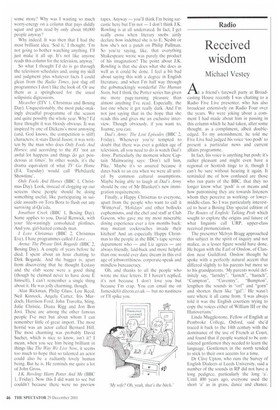Received wisdom
Michael Vestey
At a friend's farewell party at Broadcasting House recently I was chatting to a Radio Five Live presenter, who has also broadcast extensively on Radio Four over the years. We were joking about a comment I had made about him in passing in this column which he had taken, after some thought, as a compliment, albeit doubleedged. To my astonishment, he told me Five Live had judged his voice 'too posh' to present a particular news and current affairs programme.
In fact, his voice is anything but posh; it's rather pleasant and might even have a regional or Scottish tinge to it, though I can't be sure without hearing it again. It reminded me of how confused are those who run parts of the BBC, that they no longer know what 'posh' is or means and how patronising they are towards listeners whom they perceive as workingor lowermiddle-class. So I was particularly interested to hear a Boxing Day special edition of The Routes of English: Talking Posh which sought to explore the origins and future of what linguists call URP, upper-class received pronunciation.
The presenter Melvyn Bragg approached this subject in the spirit of inquiry and not malice, as a lesser figure would have done. He began with the Earl of Onslow, of Clandon near Guildford. Onslow thought he spoke with a perfectly natural accent that differed slightly to his parents but more so to his grandparents. 'My parents would definitely say, -larndry", "larnch", "harnch", "Cumpton", "Cuventry", "Bumpton", lengthen the sounds in "orf" and "gorn" and shorten them like "gal".' He wasn't sure where it all came from. 'I was always told it was the English courtiers trying to copy the voices either of William III or the Hanoverians.'
Linda Mugglestone, Fellow of English at Pembroke College, Oxford, said she'd traced it back to the 14th century with the dominance of the use of French at Court, and found that if people wanted to be considered gentlemen they needed to learn the language. Gentlemen in the north tended to stick to their own accents for a time.
Dr Clive Upton, who runs the Survey of English Dialects at Leeds University, said a number of the sounds in RP did not have a long pedigree, particularly the long 'a'. Until 400 years ago, everyone used the short 'a' as in grass, dance and chance.
According to Mugglestone. the playwright Sheridan promoted forms of speech that indicated you kept good company. Although Thomas Hardy was interested in dialects he changed his own Dorset speech by consulting self-help manuals. Pronunciation of the word 'oblige' was a sign of the new propriety. Before it had always been 'obleege'. Even George III was tactfully upbraided by the actor John Kemble. The king was told, 'It would become your Royal lips much better to say "oblige", your Majesty.'
In the 1920s, Lord Reith, a Scot and the first director-general of the BBC, anxious to eradicate what he considered travesties in pronunciations, had announcers trained to speak in the same way. 'It was,' said Mugglestone, `the linguistic equivalent of the dinner-jacket which, of course, they were supposed to wear as they read the news broadcasts.' What he would make of the BBC today doesn't bear thinking about.
Bragg mentioned Nancy Mitford, whose 1956 article about the aristocracy caused a stir but pointed out that her Uand non-U terms to describe words adopted or rejected by the upper classes were actually coined for her by Professor Ross of Birmingham University. Her sister Lady Diana Mosley recalled that Nancy had been a 'far-watcher in Curzon Street' during the war. In other words, she watched fires. 'Then somebody said, would she lecture to new far-watchers. And when she'd done it about three times the lady who ran it all asked to see her and said would you mind giving up the lectures and she said, "No, not in the least but could you tell me why?" -Well,she said, -It's your voice. Your accent irritates people so much they'd like to put you on the far."' Etonian undergraduates at Oxford were interviewed. One of them said that some younger people who still say %ice' for house or 'rind' for round weren't really posh and sounded rather ridiculous and affected. However, another recalled his sister going to a party recently. She introduced herself to a boy. 'What's your name'?' Surrey.—Sorry?"Surrey."Sorry?'
'Surrey, as in Earl orv ' Does it all matter? Being understood to all is more important. Without accents, though, much of the richness, subtlety and almost unique humour of these islands would be swept away. We would be deprived, for example, of hearing on the Today programme the Home Secretary David Blunkett accusing a retired judge of being patronising to a `council-house boy' like him for merely disagreeing with his policy, as happened this month. It was Onslow who had the last word in this entertaining programme: 'Yes, there were terrible snobberies but the snobberies of yesteryear have been replaced by the snobberies of today. There's no way you can remove the idea of snobbery from the human race. It's too much fun.'



























































 Previous page
Previous page